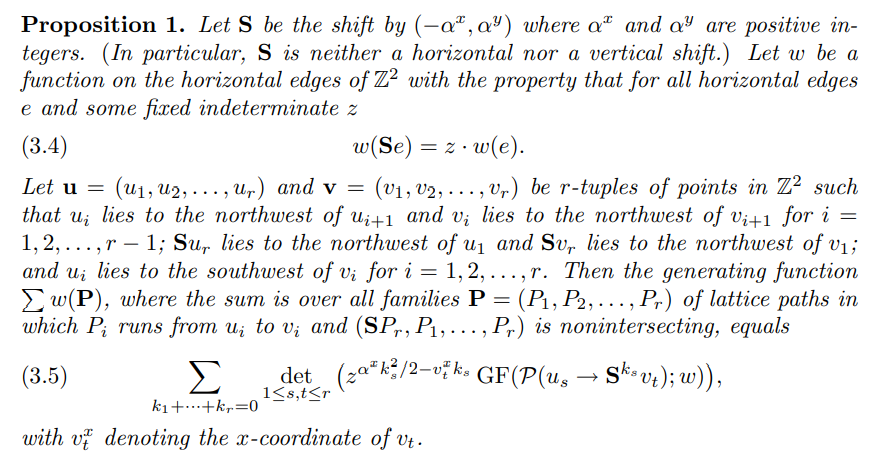In Cylindric partitions, Proposition 1, Gessel and Krattenthaler prove a formula for lattice paths on a cylinder
In our particular problem, we again have paths $((P_{1},k_{1}),...,(P_{r},k_{r}))$ but for the weight of the final-step we have
$$ w(P_{i}(n_{i}-1),S^{k_{i}}u_{i}):=\left\{\begin{matrix} (-1)^{y-x}\binom{k_{i}}{y-x}1_{k_{i}\geq y-x\geq 0},&\text{ if } k_{i}\geq 0 \\ (-1)^{k_{i}}\binom{x-y-1}{|k_{i}|-1}1_{x\geq y+|k_{i}|}, &\text{ if } k_{i}< 0 \end{matrix}\right.,$$
where $x=P_{i}(n_{i}-1)$ and $y=S^{k_{i}}u_{i}=P_{i}(n_{i})$ is the final vertex.
The existing proof from 1 fails at the step of $P_{1}$ and $SP_{r}$ intersecting because when we insert $k'_{r}=k_{1}-1$ and $k_{1}'=k_{r}+1$, the weights of the last step change i.e. the involution $\phi$ is no longer "weight-preserving". To make it "weight-preserving" we might have to add some prefactor like they did above with the $z$ factor, but it is tough to guess this prefactor.
Q: Have you seen any situations/papers in the literature where the weights themselves depend on the k-tuples $(k_{1},...,k_{r})$?
Any suggestions will be greatly appreciated.
A related question is as follows. In the above work the weights $w(e)$ change multiplicatively when shifted (i.e. $w(Se)=zw(e)$) whereas in our problem they change in a non-linear way because the weights themselves are in binomial form (i.e. $w((a,b), (c,d))$=binomial function of a,b,c,d).
Q: So I think a simpler question is , can you point me to any topics/articles where the shifted-weight $w(Se)$ is equal to some non-linear function of $w(e)$ e.g. $w(Se)=(w(e))^z$? Or is the $w(Se)=zw(e)$ the most advanced shifting in the literature?
Or even simpler, suppose that the weight $w(e)$ shifts differently depending on the path i.e.
$$w(Se_m)=z_m w(e_m)$$ if $e_m$ is an edge in the path $P_m$.(In the GK work they are all equal $z_1=z_2=...=z_r=z$)
Even this case of different constants would be extremely interesting for us.
The existing GK proof doesn't quite work because $z_1$ and $1/z_r$ don't cancel out.

